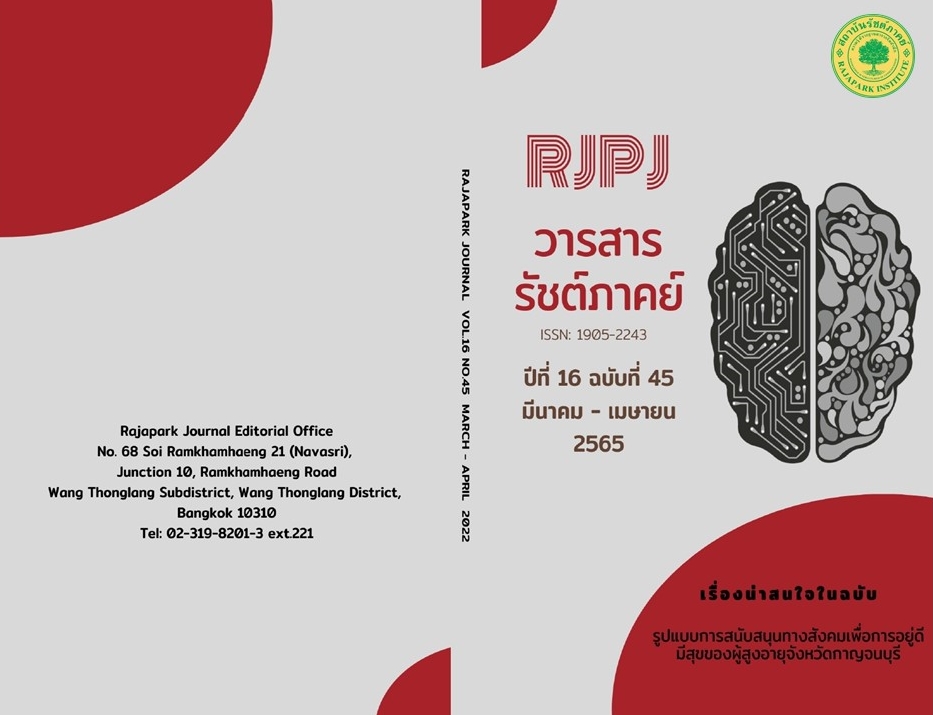Knowledge Management Process of Learning Resources in Schools: Participatory Action Research
Main Article Content
Abstract
The objective of this research was to develop the knowledge management process of learning resources in Ban Nongkung Wittayakarn School, Khon Kaen Primary Educational Service Area 1. Research participants comprised 1 administrator, 6 1-3 level high school teachers, 50 1-3 level high school students, 50 parents, 7 basic education committee members, 1 district agricultural official, and 1 subdistrict administrative organization official, totaling 115 people. Research tools comprised 1) checklist form, 2) semi-structured interview form, and 3) general meeting record form. Data analysis employed frequency and percentage statistics, and content analysis. Research findings indicate the community learning resources management process consists of 1) identifying the needed intelligence capital or knowledge; 2) creating intelligence capital or seeking benefits from existing resources, adding knowledge from outside organizations, learning from others' success, benchmarking and collecting documents, information, and knowledge according to interested groups; 3) seeking and storing organization knowledge systematically, such as in document form, computer data file, CD, and website platform; and 4) sharing, exchanging, distributing, disseminating, and transferring knowledge; and 5) utilizing or applying knowledge.
Article Details

This work is licensed under a Creative Commons Attribution-NonCommercial-NoDerivatives 4.0 International License.
Views and opinions appearing in the Journal it is the responsibility of the author of the article, and does not constitute the view and responsibility of the editorial team.
References
Becerra-Fernandez, I., Gonzalez, A., & Sabherwal, R. (2004). Knowledge Management: Challenges, Solutions, and Technologies. New Jersey: Pearson Prentice-Hall.
Bennett, J.M., & Bennett, M.J. (2004). Developing Intercultural Sensitivity: An Integrative Approach to Global and Domestic Diversity. In D. Landis, J.M. Bennett and M.J. Bennett (Eds), Handbook of Intercultural Training (3rd ed). Thousand Oaks, CA: Sage.
Coghlan, D., & Brannick, T. (2001). Doing Action Research in Your Own Organization. London: Sage.
Henri, M., & Hedgepeth, O. (2003). Size is Important in Knowledge Management. Journal of Knowledge Management Practice, 4(6), 25-38.
Kangpheng, S., & Kunlong, S. (2015). Participatory Action Research. Maha Sarakham: Maha Sarakham Rajabhat University.
Kemmis, S., & McTaggart, R. (2005). “Participatory Action Research: Communicative Action and the Public Sphere.” In N. Denzin, N.K. and Lincoln, Y.S. (Eds.), The SAGE Handbook of Qualitative Research (3rd ed.). Thousand Oaks, California: Sage.
Kemmis, S., McTaggart, R., & Nixon, R. (2014). The Action Research Planner: Doing Critical Participatory Action Research. New York: Springer.
Koenig, M.E.D., & Srikantaiah, T. (2007). Knowledge Management Lessons Learned: What Works and What Doesn’t (2nd ed.). Medford, NJ: American Society for Information Science and Technology.
Kucza, T. (2001). Knowledge Management Process Model. Retrieved April 15, 2015, from http://www.Inf.vtt.f/pdf/publication/2001/p.455.pdfl
Local Government Organization Northeastern Provinces Group. (2014). Framework for Lifelong Education Management towards Excellence in Local Occupation. Kalasin: Local Administrative Organization Northeastern Provinces Group.
Marquardt, M.J. (2002). Building the Learning Organization: A System Approach to Quantum Improvement and Global Success. New York: McGraw-Hill.
McInerney, C.R., & Koenig, M.E.D. (2011). Knowledge Management (KM) Processes in Organizations: Theoretical Foundations and Practice. Retrieved May 8, 2020, from https://doi.org/10.2200/S00323ED1V01Y201012ICR018
National Productivity Institute. (2005). Knowledge Management from Theory to Practice. Bangkok: SE-EDUCATION.
Nonaka, I., & Takeuchi, H. (2004). The Essence of Innovation (with A. Katsumi). Tokyo: Nikkei BP.
Office of the Basic Education Commission. (2013). Student Support System for Improving the Quality of Life and Solve the Social Crisis, the Path to Professional Teachers. Bangkok: Chuan Printing.
Office of the National Education Commission. (2010). Student Reform is the Most Important. Bangkok: Teachers Council of Thailand Ladprao.
Office of the Public Sector Development Commission. (2007). Handbook of Change Management to Enhance the Threat of Excellence in the Performance of Government Agencies. Bangkok: Management System Development Group Office of the Public Sector Development Commission.
Panich, W. (2019). Knowledge Management. Retrieved 15 September 2020 from http://huahin.dusit.ac.th/bg/KM/KM_Article.pdf.
Probst, G. R. (2000). Managing Knowledge: Building Blocks for Success. Chichester: John Wiley & Sons.
Probst, G., S. Raub., & K, Romhardt. (2000). Managing Knowledge: Building Blocks for Success. England: John Wiley & Sons.
Sararattana, W. (2018). Research in Educational Administration: Concepts and Case Studies (4th ed.). Bangkok: Thiphayawisut.
Srikantaiah, T. & Koenig, M.E.D. (2002). Knowledge Management for Information Professional. New Jersey: Information Today.
Stringer, E. (2004). Action Research (2nd ed.). California: Sage.
Tannonbaum, S.I., & Alliger, G.M. (2000). Knowledge Management: Clarifying the Key Issue. U.S.A.: The International Association for Human Resource Information Management.
Trapp, H. (1999). Benefits of an Intranet-based Knowledge Management System Measuring the Effect. Retrieved May 8, 2020, from http://www.avinci.de/competence/publikationen/diplomarbeit_holger_trapp.pdf.
Turban, E., Lee, J., King, D., & Chung, H. (2004). Electronic Commerce: A Managerial Perspective. London: Prentice Hall International.
Wasi, P. (2002). New Human Development for A Sustainable Future (5th ed.). Bangkok: Moh-Chao-Ban Publishing House.
Wiig, K.M. (2003). Knowledge Management Has Manta Facets. Retrieved July 20, 2020, from http://www.krii.com/downloads/FourKMFacets-pd.
Wijarn, B. (2009). Development of a Learning Organization (6th ed.). Bangkok: ExpertNet.


